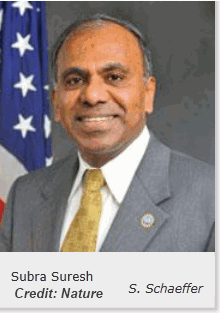|
News & Views item - September 2011 |
![]() National Science Foundation Director Explains His Agency to
Dealing With the Grim Fiscal Outlook. (September 13, 2011)
National Science Foundation Director Explains His Agency to
Dealing With the Grim Fiscal Outlook. (September 13, 2011)
 Subra
Suresh, former dean of engineering at MIT, is almost one year into his six-year
term as director of the National Science Foundation (NSF). NatureNews
sent Eric Hand over to the NSF to have a chat with Dr Suresh to see how he was
getting on.
Subra
Suresh, former dean of engineering at MIT, is almost one year into his six-year
term as director of the National Science Foundation (NSF). NatureNews
sent Eric Hand over to the NSF to have a chat with Dr Suresh to see how he was
getting on.
Some of the dialogue
Eric Hand: How important is it that science looks useful in the current budget climate?
Dr Suresh: It's important for us to articulate the usefulness of science. But for an agency like the NSF, it will be dangerous if we choose to follow the latest fashion and lose sight of the long-term need to support science. We are not a mission agency. We don't have to produce a product next year.
Eric Hand: The National Science Board, the NSF's governing body, has a task force that is evaluating the two funding criteria: intellectual merit and broader impacts. How would you define broader impacts?
Dr Suresh: Broader impact has many different flavours. In
some cases, the science itself can have a broad societal impact. You could do
something with NSF-funded research that changes the way undergraduate education
happens around the country: create a tool, a mechanism, a model, software.
That's broader impact.
Bringing under-represented groups
to your lab, or giving talks in community colleges about your research, exciting
those who would otherwise not go into science. That's also broader impact.
Eric Hand: How much should researchers be thinking about broader
impacts?
Dr Suresh: We don't want to
compromise scientific merit at all; the work has to be outstanding before it
gets funding. But given that, I think it's useful to ask the question: what's
the impact of this work? That is why, in 1997, the NSF created broader impact as
an additional criterion.
Eric Hand: You're still quite new to Washington. What has surprised you most?
Dr Suresh: I have to mention a quote I've heard attributed to Woodrow Wilson, who was president of Princeton University in New Jersey before he was president of the United States. When he arrived in Washington, a reporter asked him why he left his Ivy League school. Apparently, Mr Wilson responded: "I came to Washington so I don't have to deal with politics anymore."
Some of this is new, but not all of it.